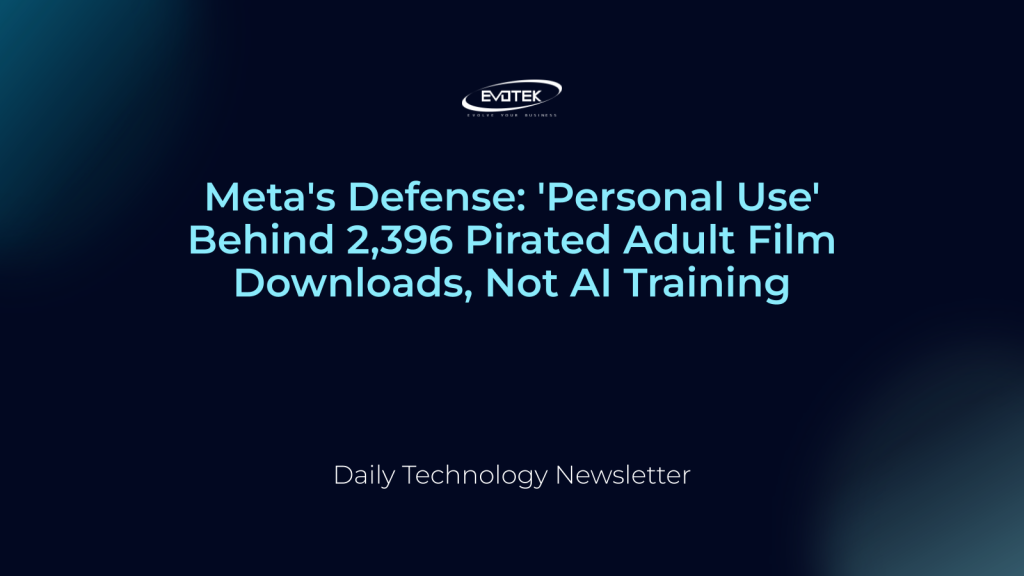Tech giant Meta is embroiled in a significant legal battle, leveraging a classic BitTorrent defense against accusations of widespread copyright infringement. The company is pushing back against claims made by adult film producers Strike 3 Holdings and Counterlife Media, who allege Meta downloaded thousands of pirated adult films for AI model training.
Lawsuit Alleges Massive Copyright Infringement for AI Training
The core of the dispute revolves around accusations that Meta’s corporate network was used to download at least 2,396 copyrighted adult films since 2018. These films, from popular brands such as Vixen, Tushy, Blacked, and Deeper, were allegedly acquired to aid Meta’s AI video training initiatives. The adult content producers discovered this alleged activity after Meta’s BitTorrent practices were brought to light in a separate lawsuit filed by authors, where Meta admitted to sourcing content from pirate sites.
A subsequent scan of BitTorrent data by Strike 3 Holdings and Counterlife Media reportedly identified 47 IP addresses linked to Facebook (Meta) as sources of infringement. If found liable, Meta could face staggering damages reaching up to $359 million.
Meta Fires Back: IP Addresses Insufficient, Downloads for “Personal Use”
In a bold move, Meta has filed a motion to dismiss the complaint, labeling it “nonsensical.” The tech company, often on the receiving end of “copyright troll” accusations from entities like Strike 3, is now turning the tables with a defense strategy rooted in established BitTorrent piracy jurisprudence.
The IP Address Conundrum
Meta’s primary argument asserts that IP address evidence alone is insufficient to prove direct infringement. Citing past rulings from the Ninth Circuit Court of Appeals, Meta argues that “something more” is required to establish who the direct infringer is. The company contends there’s no evidence the alleged activity was centrally orchestrated for AI training.
Timing Contradicts AI Training Theory
Another crucial point in Meta’s defense is the timeline. The company highlights that the alleged “sporadic torrenting activity” began in 2018, years before Meta’s relevant AI research into multimodal models and generative video purportedly started in 2022. “Plaintiffs’ supposition that Meta must have instigated these downloads for AI training is implausible on its face,” Meta states in its motion.
“Private Personal Use,” Not AI Datasets
Instead of AI training, Meta offers an alternative explanation: the downloads were likely for “private personal use” by employees or visitors on its corporate network. The tech giant points to the relatively small volume of downloads—roughly 22 per year across dozens of Meta IP addresses—as indicative of individual use, rather than a concerted effort to build the massive datasets typically required for effective AI training. Meta also refutes claims that it used thousands of external IP addresses to conceal its activities, questioning why it would simultaneously use easily traceable corporate IP addresses for many hundreds of other alleged infringements.
Denial of Secondary Liability
Meta further argues against claims of secondary liability, including contributory and vicarious copyright infringement. Citing precedents from other BitTorrent piracy lawsuits, Meta asserts it had no financial interest in these alleged “personal use” downloads, nor did it have the knowledge or obligation to supervise or intervene in such activities. Therefore, it argues, the conditions for secondary liability are not met.
Meta is seeking a full dismissal of the complaint, asserting that the claims lack factual support and present a theory of liability that is illogical. Strike 3 Holdings and Counterlife Media now have two weeks to oppose Meta’s motion to dismiss, after which the California federal court will decide the future of this high-stakes legal battle.

 日本語
日本語 한국어
한국어 Tiếng Việt
Tiếng Việt 简体中文
简体中文